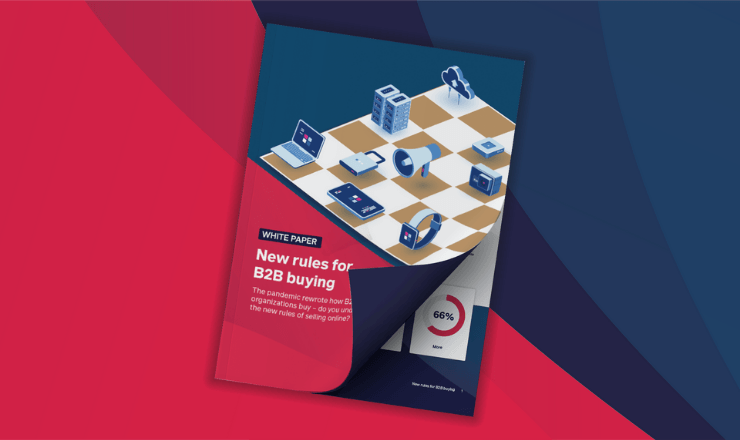

So, your organization has recognized the importance of starting an e-commerce website. And it managed to set aside the necessary budget to set up an online store. There are now great plans, huge ambitions, endless possibilities and — an unforeseen workload, with no dedicated e-commerce team.
Who will manage the content or discuss the responsibilities of e-commerce with the marketing team? Who has the knowledge to gather and leverage online data? Who is ultimately responsible for the web store’s sales results? Do you need to hire an e-commerce team or add new e-commerce team roles?

You are not alone here. Knowing where to start with e-commerce roles or how to expand and structure your e-commerce team can come with some uncertainty. Robert Pennings, one of our dedicated Customer Success Managers, has been supporting B2B companies as they get started with their e-commerce website for over 10 years, and has advised many of them on how to build a successful e-commerce team. In the following interview, we picked his brain to help you get the right people in place to drive your e-commerce success.

Are you looking to get started with e-commerce or switch platforms?
Follow our step-by-step checklists, tips and best practices to help you launch your next web store
Where should an organization start when building an e-commerce team structure?
“Every brick-and-mortar store needs a manager. The same goes for an online store. E-commerce inventory, pricing, marketing, and sales need attention and care — every web store needs to be actively managed.
“It is therefore important to appoint someone in your organization to fully focus on your e-commerce website. For smaller companies, this need not be a whole e-commerce team or even a full-time employee, but I would recommend that you assign the responsibility of the e-commerce platform to a specific person. If everyone is in charge, no one is in charge.
“Every brick-and-mortar store needs a manager. The same goes for an online store.”
— Robert Pennings | Customer Success Manager at Sana Commerce
“Let’s call this person the e-commerce manager. An e-commerce manager is someone who has the right skillset to oversee your online business. This person has a good knowledge of e-commerce and makes sure to keep this knowledge up to date — because e-commerce is an ever-changing landscape.
“Ideally, this person also understands how to drive change within an organization: for many of our Sana Commerce customers, to get all departments on board when launching an online store can prove quite the challenge. So, your e-commerce manager needs to be able to convince each department of the benefits of e-commerce and its objectives.”
What are the responsibilities of the e-commerce manager?
“Although this differs based on the nature and culture of each organization, I do see some common responsibilities among the e-commerce managers that work for our customers. Successful e-commerce managers keep a close eye on their own e-commerce team and other impacted departments within the organization, as well as suppliers and, of course, customers. This translates into the following responsibilities:
- Monitoring and optimizing online sales results
- Defining and executing an e-commerce strategy, alongside other departments responsible for tasks such as online marketing and content management
- Determining budget for the e-commerce channel
- Managing e-commerce team members and team roles (if applicable)
- Gathering support for e-commerce within the organization
- Reporting to higher management
- Activating web store accounts for new and existing customers
- Gathering feedback from customers who order online
- Managing communications, process changes and services related to e-commerce
- Managing agreements with e-commerce suppliers (such as Sana Commerce)
“The e-commerce manager might not be a direct link in the sales process, but their work and vision is crucial for online sales success. They need to be able to translate a business, its values and products into an online environment. And they need to have goals and KPIs to work towards.”

Which departments and roles should be involved in e-commerce?
“E-commerce, and especially B2B e-commerce, is a critical business tactic for your entire organization. Not only should each department be actively involved in the e-commerce process, but every department can also reap the benefits of having a web store.
“This is what we see with our best-performing e-commerce customers. They understand the impact that e-commerce has on each department, and how each department can contribute to online success. They use their online data to improve marketing campaigns, they leverage their web store as a tool to decrease the pressure on customer support teams, and they give sales teams tablets with access to their Sana store to increase efficiency. Every department and role wins if there is a vision.”
“This is what we see with our best-performing e-commerce customers. They understand the impact that e-commerce has on each department, and how each department can contribute to online success.”
— Robert Pennings | Customer Success Manager at Sana Commerce
What is the biggest challenge that B2B companies face when structuring an e-commerce team? And how can they overcome it?
“Most customers think that finding and hiring the right people with the right skillset and knowledge is the biggest hurdle. The truth is that this is often not the case. The most common challenge that I see our customers face is that senior management does not assign enough urgency to e-commerce. E-commerce needs to be an organization-wide strategic priority. Resources and budgets need to be made available for such a project. Only once these priorities are taken care of can you start looking for the right people to form your e-commerce team.

Ready for 2022?
Get 2022 trends insights, the latest data on your B2B buyers, plus an exclusive trends timeline in our report “New rules for B2B buying.”
“First and foremost, you will want to look for people who are the right fit for your company values and culture. At Sana Commerce, we prefer to hire talented people who fit the company culture, over people who may have the best skillset but are not a match for the team.
“Another challenge is that no bachelor’s or master’s degree in e-commerce is sufficient in itself. The field undergoes changes much quicker than even the duration of an education. If you have people in your organization who learn quickly, who enjoy change and who know how to drive change in the organization, do involve them in your e-commerce team. This will significantly increase your chance of having a successful and stable e-commerce platform.”
“You should create e-commerce team roles that contribute to your specific company objectives.”
— Robert Pennings | Customer Success Manager at Sana Commerce
Which roles should be created if a business wants to expand its e-commerce team?
“There are no set answers to this question. The e-commerce team structure you create should be aligned with your e-commerce strategy and objectives — which are in turn aligned with your overall company strategy and goals. The products you sell and the way you sell them require a specific sales and marketing approach.
“For example, it does not make sense to hire an online advertising specialist if you only want to sell to existing customers. However, if you have an open web store in a market where competition is fierce, it might be beneficial to hire someone for this role. Therefore, you should create e-commerce team roles that contribute to your specific company objectives. We are always more than happy to talk through the different roles you might require, and how they add value to your business.”

What advice do you have for smaller businesses that cannot dedicate too many resources to e-commerce, but want to achieve e-commerce success?
“Resources with the right skillset will always be needed. Therefore, your company must allocate or dedicate these resources. My advice here would be to determine who within your management team will take up the responsibility for e-commerce. Then, set up high-level goals, KPIs and a roadmap, and review this roadmap every three to six months. Start small and work your way to the top step by step. Delegate the smaller tasks to other people in the organization, but make sure that someone from management keeps the overview and is responsible for the end results.”
“E-commerce will be profitable if you give it the attention it needs.”
– Robert Pennings | Customer Success Manager at Sana Commerce
Any final advice for an organization that’s getting started with e-commerce?
“E-commerce will be profitable if you give it the attention it needs. Create a business case and calculate on a regular basis how adding people to your e-commerce team impacts the revenue, costs and efficiency of your organization.”
Find out more about how to start an e-commerce website
- If you’re planning to launch a new web store, be sure to read our blog post on how to start your B2B e-commerce project and download our Ultimate Guide to E-Commerce: From Planning to Going Live for checklists, practical tips and best practices to steer you through your entire project.
- Facing some resistance from your boss or colleagues? Read our blog post for advice on how to overcome internal resistance to launching your web store. Plus, get tips from other companies on how they got their e-commerce platform up and running in our customer success stories.
- Already working with us? Then contact your Sana Customer Success Manager, or your ERP partner if they are your direct line of support, for more help and advice.

E-commerce project: From planning to going live
Download our ultimate guide to e-commerce



